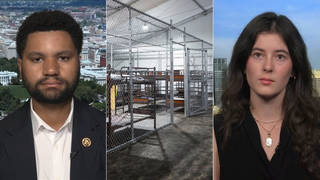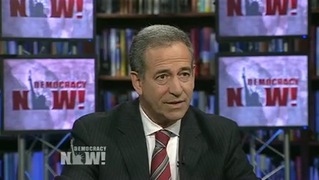
Guests
- John Nicholspolitical writer for The Nation and the author of Uprising: How Wisconsin Renewed the Politics of Protest, from Madison to Wall Street.
Wisconsin Gov. Scott Walker has survived a historic recall election more than a year after launching a controversial effort to roll back the bargaining rights of the state’s public workers. Walker outspent his opponent, Milwaukee Mayor Tom Barrett, seven to one after raising millions of dollars from right-wing donors outside the state. We’re joined by John Nichols, a correspondent for The Nation. “We always like to tell ourselves that if the people get organized enough, they can offset any amount of money,” Nichols says. “But in Wisconsin, we got a pretty powerful lesson about this new era we’re entering into with unlimited cash … It’s something we should be taking a good look at — not merely for Wisconsin, but for the whole country.” Nichols also criticizes the Democratic National Committee and President Obama for mostly staying on the sidelines as Republicans nationwide rallied around Walker. “The comparison between tens of millions of dollars and an all-in effort by the RNC and by national Republicans [versus] a tweet from President Obama, I think, sums it up a little bit painfully,” he says. [includes rush transcript]
Transcript
NERMEEN SHAIKH: We begin our show in Wisconsin, where Republican Governor Scott Walker has survived a historic recall election over Milwaukee Mayor Tom Barrett. Walker won, 53 to 46 percent, a 7 percent margin. He had outspent Barrett by a seven-to-one margin. Walker becomes the first governor in the country to survive a recall election.
Meanwhile, Democrats appear to have regained control of the Wisconsin Senate as former Democratic State Senator John Lehman maintains a narrow lead over incumbent Republican Van Wanggaard, who was also facing recall. The statewide recall effort was launched last year after Scott Walker and Republican legislators stripped public sector unions of their collective bargaining rights and reduced their benefits.
Shortly after polls closed last evening, Walker delivered a victory speech to his supporters.
GOV. SCOTT WALKER: Tonight—tonight we tell Wisconsin, we tell our country, and we tell people all across the globe that voters really do want leaders who stand up and make the tough decisions. But now—but now it is time to move on and move forward in Wisconsin. Tomorrow—tomorrow I’ll meet with my cabinet in the state’s capitol, and we’ll renew our commitment to help small businesses grow jobs in the state. We’ll renew our commitment to help grow the quality of life for all of our citizens, both those who voted for me and those who voted for someone else, because tomorrow—tomorrow is the day after the election, and tomorrow we are no longer opponents. Tomorrow we are one as Wisconsinites, so, together, we can move Wisconsin forward.
NERMEEN SHAIKH: Wisconsin Governor Scott Walker speaking last night. Walker’s opponent, Mayor Tom Barrett, delivered his concession speech in Milwaukee.
MAYOR TOM BARRETT: I just got off the phone with Governor Walker and congratulated him on his victory tonight. We agreed that it is important for us to work together. And I want to thank all of you for the work that you have done. This has been—this has been the most amazing experience of our lives. And what we have seen over the last 16 months is we have seen this democracy come alive. To those of you—to those of you who fought, who obtained signatures, who stood out in the cold, who did what you thought was right: never, ever stop doing what you think is right. That’s what makes this such a great country.
AMY GOODMAN: Tuesday’s election was the most expensive in Wisconsin history, with more than $63 million spent. In a final flurry of television advertising, Walker outspent Barrett seven to one. Walker raised millions of dollars from conservative donors outside the state thanks to a clause in the state law that allowed him months of unrestrained fundraising. The recall election was also the first election since the Citizens United ruling, which opened the floodgates for unlimited corporate spending on election campaigns.
We’re going directly now to Madison, Wisconsin, to John Nichols. He is at Wisconsin Public Television. He is a political writer for The Nation and the author of Uprising: How Wisconsin Renewed the Politics of Protest, from Madison to Wall Street.
John Nichols, welcome back to Democracy Now! Can you react to what happened last night?
JOHN NICHOLS: Sure. I think we had an incredible test in Wisconsin of money power versus people power. And we always like to tell ourselves that if the people get organized enough, they can offset any amount of money. But in Wisconsin, we got a pretty powerful lesson about this new era we’re entering into with unlimited cash, as well as unlimited so-called “independent expenditures” that go parallel to those of a candidate. And the result in Wisconsin was an unsettling one. You saw a governor who had really put himself in a position where, I think, in most political instances, he would have been unelectable. His poll numbers last year were terrible. There was a broad sense of discomfort with him. And over the period not just of this campaign but really of the better part of a year, he used massive television advertising, as well as astounding amounts of mailings—more than $5 million worth of mailings—and huge amounts of internet and social media communication, to basically alter people’s impressions of him sufficiently to win a 53-46 victory. It’s something we should be taking a good look at, not merely for Wisconsin, but for the whole country.
NERMEEN SHAIKH: John Nichols, you’ve also suggested that the Democrats made some mistakes in their campaign—
JOHN NICHOLS: Oh, yeah.
NERMEEN SHAIKH: —particularly with respect to messaging, the message they were trying to get across.
JOHN NICHOLS: Yeah, I think that’s a very serious issue. When you’re outspent massively—and there’s simply no question that the Democrats were on the weak end of the money chain in this fight—you have to spend your money wisely. Unfortunately, I think the Democrats fought the old war. They marshaled their money and kept it for a last battle against Scott Walker, in which they accused him of many things, much of it—much of the accusations legitimate. But at the end of the day, Walker had succeeded early on in defining the issues and defining the debate.
I think the Democrats and, frankly, their allies in the labor movement failed to get out front and talk about two critical things. First off, they needed to talk about why collective bargaining is important. This battle over labor rights was where the fight in Wisconsin began, and yet it was Scott Walker who, for the last year, did a lot more of the messaging on the assault on collective bargaining rights that he launched back in February 2011. Similarly, I think that Democrats and labor needed to talk about the recall power and explain it in much more detail. Walker was very, very critical of the recall. And I think, again, he used a lot of money and messaging to win that debate.
AMY GOODMAN: John Nichols, what about the Democratic National Committee, President Obama not going to Wisconsin, the DNC not putting in the kind of money that people were calling for, although Walker had tens of millions of dollars poured into his campaign from outside the state?
JOHN NICHOLS: Absolutely. It was a stark contrast. What you see is a Republican Party that is activist and engaged, not just at the national level but down into the state and local levels. The Republican National Committee chairman, Reince Priebus, who is a Wisconsinite and who’s actually a member of the law firm that is representing Governor Walker in many of his current legal troubles, said from the start of the race that the Republicans were, quote-unquote, “all in” this contest, meaning that they would be there for whatever was necessary. The Republican Governors Association began attacking Democrat Tom Barrett before he had announced his candidacy. So it was just an overwhelming level of Republican engagement.
In contrast to that, the Democratic National Committee really was in a bit of a wrangle with state Democrats about whether they would give $500,000 for some get-out-the-vote efforts. And President Obama meticulously avoided visiting the state and made his final contribution to the campaign, which was a tweet on Monday night. The comparison between tens of millions of dollars and an all-in effort by the RNC and by national Republicans and a tweet from President Obama, I think, sums it up a little bit painfully.
NERMEEN SHAIKH: What do you think the significance is, John Nichols, of Democrats having regained control of the State Senate?
JOHN NICHOLS: It has some significance. We are in the midst of an election year, and so there will be, amazingly enough, more State Senate contests come November. And so, it’s a brief period where Democrats have clear control of the Senate. But there is significance in that. First off, Governor Walker is an incredibly ambitious partisan. And so, he has a lot of ideas, a lot of things he’d like to do. Because Democrats control one chamber of the state legislature, it’s going to be very hard for him to launch special sessions of the legislature on issues he wants to work on. He is particularly interested in taking apart many of the state’s environmental laws in order to allow for a particularly controversial form of mining in northern Wisconsin. That is likely to be blocked. Additionally, he’s been very, very aggressive on voting rights issues. He’s a big backer of voter ID laws, changes in registration laws, things of that nature. That would have been the sort of thing that you might have seen him initiate, and his allies initiate, if they had control of the State Senate. Without it, they are unlikely to be able to do these things.
AMY GOODMAN: Governor Walker outspent Tom Barrett seven to one. I want to turn to an ad that was bankrolled by the Virginia-based Coalition for American Values.
KAREN: I didn’t vote for Governor Walker.
LINDA: I did not vote for Scott Walker.
TIM: I didn’t vote for Scott Walker, Joel, but I’m definitely against this recall.
JIM: Recall isn’t the Wisconsin way.
KAREN: There’s a right way. There’s a wrong way. And I just—I think this is the wrong way.
JIM: I elected him to do a job.
BOB: Let him serve it out.
BOB: Living in a democracy, you have to have faith in who the people elect.
CHAD: I didn’t vote for Scott Walker, but I’m against the recall.
AMY GOODMAN: That’s one of the ads that ran over and over in Wisconsin. And can you talk about the role of the Koch brothers, John Nichols, as we look about what—
JOHN NICHOLS: Sure.
AMY GOODMAN: —at what this means for the national elections coming up in November?
JOHN NICHOLS: Well, I think you got right at there, in the sense of what this means for national elections. I think Wisconsin was a testing ground, where particularly the Republicans and particularly Republicans working in the area of independent expenditures, folks like Karl Rove and the many other people who have set up super PACs and new independent groupings—supposedly independent groupings—to help conservative and Republican candidates, they came in very, very early. They came in strong with messaging. That ad you just played was an ad talking about what a bad idea recalls were. And that became a real underpinning of the race. There were so many ads that came in.
And one thing to remember is that the Koch brothers were in very, very early and very, very big. We still don’t know how much money they actually moved into the state. And in some senses, we may never know, because some of these expenditures come in quite hidden ways. But what we can tell you is they gave more than a million dollars to the Republican Governors Association, which was in very, very big. There was millions spent by Americans for Prosperity, a group that they’re very active with. Additionally, there are other groups that they fund and have been engaged with. There have been some estimates that the amount of money they put into Wisconsin is in the range of $6 million or $7 million. It could theoretically have been more. But it is very, very important to understand that the Koch brothers, particularly David Koch, said specifically that they were going to go all in, they were going to do everything they could to make sure that Scott Walker was reelected, because he was running an agenda that they approve of.
What they learned from Wisconsin is, this approach works. And they are definitely highly engaged with the fall elections. And I think it’s important—when we talk about the fall elections, we tend to focus a lot on the presidency. Remember also that the fall elections are going to see a bitter and intense battle for the U.S. Senate. And I think it’s especially important to take a look at what happened in Wisconsin and to recognize that with this money power, there are a lot of forces, both within the Republican Party and in so-called independent groupings, that could go into big Senate races around this country and have a profound impact. And I think that’s where we’re going to have to keep an awfully close eye on what this money power is doing over the next couple months.
NERMEEN SHAIKH: John Nichols, there were also primaries held in other states yesterday. Can you say a little about Montana, California?
JOHN NICHOLS: Yeah, we had, you know, a small-scale Super Tuesday yesterday, with primaries from the East Coast to the West Coast. Two Democratic members of Congress were defeated by other Democratic members of Congress in primaries. There was a California primary between Brad Sherman and Howard Berman in the L.A. area. Sherman won, and that was an interesting fight, because Sherman tended to be kind of the more populist candidate of the two. Similarly, out in New Jersey, you saw Steve Rothman, a congressman out there, defeated by Bill Pascrell. And again, I think the somewhat more liberal candidate won there.
The big race that really interested me was in Montana. And Democrats have nominated for governor of Montana Steve Bullock, who is their current attorney general. And in a way, he brings our conversation here full circle, because Steve Bullock, as attorney general of Montana, is the fellow who has battled Citizens United , gone to the Supreme Court arguing that states should be able to keep corporate money out of their elections. That case is actually in the courts right now. But this guy has been nominated for governor of Montana, running on a—I think a quite populist, anti-Citizens United, anti-big money campaign. And I think we’re going to be keeping a close eye on him to see whether we get another of these old-fashioned Western populist governors coming in talking about big money. Frankly, I think that’s an encouraging development from the results last night.
AMY GOODMAN: John Nichols, we want to thank you for being with us, political writer for The Nation, author of Uprising: How Wisconsin Renewed the Politics of Protest, from Madison to Wall Street, speaking to us from Wisconsin Public Television in Madison.
This is Democracy Now! When we come back, Nobel Prize-winning economist Joseph Stiglitz. Stay with us.













Media Options